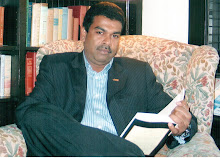My former boss and prominent journalist cum blogger Datuk A. Kadir Jasin wrote an interesting piece in his blog Other Thots. I reproduce the full piece here:
MONDAY, JUNE 07, 2010
Isu Sime Darby: Hukum Seorang, Hukum Semua
A Kadir Jasin
[Komen menggunakan pengenalan anonymous TIDAK AKAN DILAYAN. Sila gunakan nama sebenar atau nama samaran. Jikalau menggunakan anonymous, sila nyatakan nama di penghujung komen. Ulasan yang mengandungi unsur fitnah, hasutan, perkauman dan bahasa kesat tidak akan disiarkan. Ulasan yang terkeluar daripada tajuk tidak akan diberi keutamaan.]
URA-URA Kelab Penyokong Kerajaan Barisan Nasional (BBCBN) hendak mendesak kerajaan agar tidak lagi melantik pesara sektor awam menganggotai lembaga pengarah syarikat-syarikat berkaitan kerajaan (GLC) ada baik dan buruknya.
Laporan media massa mengatakan cadangan itu diuar-uarkan (bukan war-war) berikutan kerugian besar yang dialami dua GLC iaitu Sime Darby Berhad dan Pos Malaysia Berhad.
Timbalan Pengerusi Kelab, Bung Moktar Radin, memberitahu portal berita The Malaysian Insider dia akan membangkitkan perkara itu dalam sidang Dewan Rakyat yang bermula hari ini.
“Kalau mereka tidak berminat (menerajui syarikat-syarikat besar) jangan paksa mereka memegang jawatan pengarah khususnya di syarikat-syarikat besar dan ternama macam Sime Darby,” kata Ahli Parlimen Kinabatangan, Sabah, itu.
Sebarang usaha untuk mendalami kefahaman mengenai kerugian atau prestasi buruk GLC, khasnya oleh Parlimen, adalah dialu-alukan. Malah ia satu kewajipan.
Namun adalah tidak adil dan tidak tepat menyalahkan ahli lembaga pengarah (ALP) yang terdiri daripada bekas pegawai kerajaan sahaja. Tindak-tanduk pengurusan pun wajib didalami juga.
Kita ambil contoh Sime Darby (SD). Ia sudah beberapa kali mengalami masalah yang menyebabkan kerugian berbilion ringgit. Mungkin ramai sudah lupa kemuflisan Sime Bank dan kerugian besar SD pada akhir tahun 1990an.
Sebenarnya kali ini SD tidak rugi. Malaj bagi separuh pertama tahun ini ia mencatatkan RM1.113 bilion keuntungan. Yang rugi lebih RM1 bilion itu adalah operasi minyak dan gas di Teluk Parsi dan pembinaan penjana elektrik hidro Bakun.
Kerugian operasi ini menjadi isu sensasi kerana SD baru sahaja menelan dua syarikat Permodalan Nasional Berhad (PNB) yang lain iaitu Golden Hope dan Guthrie Corporation.
Apabila penggabungan ini diilhamkan ketika pentadbiran Abdullah Ahmad Badawi dan didalangi oleh CIMB Bank atas nama Synergy Drive Sdn Bhd. pada tahun 2007, ramai yang menantangnya, termasuk PNB walaupun secara diam-diam.
Sebelum penggabungan, ketiga-tiga syarikat perladangan PNB itu beroperasi dengan menguntungkan walaupun ramai ALPnya terdiri daripada pesara awam, termasuk Pengerusi PNB, Ahmad Sarji Abdul Hamid.
Tetapi apabila SD siap digabungkan dan diuar-uarkan sebagai syarikat perladangan kepada sawit terbesar di dunia, bekas Timbalan Perdana Menteri, Musa Hitam, dilantik pengerusi dengan Ahmad Sarji sebagai timbalan.
Bukan Musa sahaja yang menjadi pengerusi atau ALP GLC. Ramai lagi ahli politik, sama ada yang bersara atau masih cergas, menjadi pengerusi dan ALP GLC. Jadi jangan salahkan ALP yang terdiri daripada pesara awam sahaja.
Malah ada ALP yang terdiri daripada orang politik sangat teruk. Ada ketua dan timbalan ketua bahagian yang tak tahu apa-apa pun (clueless) mengenai perniagaan dilantik untuk dapat elaun. Jadi Bung Mokthar wajib juga bahaskan peranan ALP yang terdiri daripada orang politik.
Khusus mengenai SD, saya lebih cenderung menganggapnya sebagai syarikat amanah Bumiputera dan bukan GLC. GLC milik semua rakyat Malaysia tetapi agensi amanah seperti PNB adalah milik Bumiputera.
Saya kata begitu kerana majoriti saham SD dipegang oleh Skim Amanah Saham Bumiputera dan PNB. PNB adalah agensi amanah Bumiputera.
Mengenai pelantikan menjadi APP ini, kita kena juga tanya, siapa yang lantik mereka kalau bukan kerajaan sendiri? Akibatnya, jadilah mereka pengarah bebas yang tidak bebas.
Pada satu masa dulu, SD mempunyai apa yang dipanggil International Board of Directors atau Lembaga Pengarah Antarabangsa yang terdiri daripada orang kenamaan Asia dan dunia.
Saya pernah beberapa kali dijemput oleh Pengerusi SD waktu itu, Allahyarham Tun Dr Ismail Mohd Ali, untuk makan tengah hari bersama mereka. Salah seorang yang saya masih ingat adalah Sir David Li Kwok-po yang kini berupa pengerusi dan ketua eksekutif Bank of East Asia, Hong Kong.
Jadi, dalam hal SD ini adalah tidak patut menyalahkan dan menghukum seorang sahaja iaitu ketua pegawai eksekutif, Ahmad Zubir Murshid.
Keseluruhan ALP dan pengurusan kanan yang membantu Ahmad Zubir wajib dipertanggungjawabkan. Begitu juga juruaudit luar jika mereka gagal membuat catatan (qualification) dalam audit tahunan mereka.
Posted by A KADIR JASIN at 8:11 AM 27 comments






